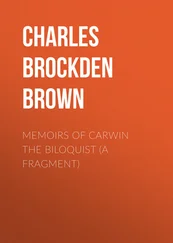Charles Brown - Ormond; Or, The Secret Witness. Volume 2 (of 3)
Здесь есть возможность читать онлайн «Charles Brown - Ormond; Or, The Secret Witness. Volume 2 (of 3)» — ознакомительный отрывок электронной книги совершенно бесплатно, а после прочтения отрывка купить полную версию. В некоторых случаях можно слушать аудио, скачать через торрент в формате fb2 и присутствует краткое содержание. Жанр: foreign_antique, foreign_prose, на английском языке. Описание произведения, (предисловие) а так же отзывы посетителей доступны на портале библиотеки ЛибКат.
- Название:Ormond; Or, The Secret Witness. Volume 2 (of 3)
- Автор:
- Жанр:
- Год:неизвестен
- ISBN:нет данных
- Рейтинг книги:5 / 5. Голосов: 1
-
Избранное:Добавить в избранное
- Отзывы:
-
Ваша оценка:
- 100
- 1
- 2
- 3
- 4
- 5
Ormond; Or, The Secret Witness. Volume 2 (of 3): краткое содержание, описание и аннотация
Предлагаем к чтению аннотацию, описание, краткое содержание или предисловие (зависит от того, что написал сам автор книги «Ormond; Or, The Secret Witness. Volume 2 (of 3)»). Если вы не нашли необходимую информацию о книге — напишите в комментариях, мы постараемся отыскать её.
Ormond; Or, The Secret Witness. Volume 2 (of 3) — читать онлайн ознакомительный отрывок
Ниже представлен текст книги, разбитый по страницам. Система сохранения места последней прочитанной страницы, позволяет с удобством читать онлайн бесплатно книгу «Ormond; Or, The Secret Witness. Volume 2 (of 3)», без необходимости каждый раз заново искать на чём Вы остановились. Поставьте закладку, и сможете в любой момент перейти на страницу, на которой закончили чтение.
Интервал:
Закладка:
In listening to his discourse, no one's claim to sincerity appeared less questionable. A somewhat different conclusion would be suggested by a survey of his actions. In early youth he discovered in himself a remarkable facility in imitating the voice and gestures of others. His memory was eloquently retentive, and these qualities would have rendered his career, in the theatrical profession, illustrious, had not his condition raised him above it. His talents were occasionally exerted for the entertainment of convivial parties and private circles, but he gradually withdrew from such scenes as he advanced in age, and devoted his abilities to higher purposes.
His aversion to duplicity had flowed from experience of its evils. He had frequently been made its victim; inconsequence of this his temper had become suspicious, and he was apt to impute deceit on occasions when others, of no inconsiderable sagacity, were abundantly disposed to confidence. One transaction had occurred in his life, in which the consequences of being misled by false appearances were of the utmost moment to his honour and safety. The usual mode of salving his doubt he deeded insufficient, and the eagerness of his curiosity tempted him, for, the first time, to employ, for this end, his talent at imitation. He therefore assumed a borrowed character and guise, and performed his part with so much skill as fully to accomplish life design. He whose mask would have secured him from all other attempts, was thus taken through an avenue which his caution had overlooked, and the hypocrisy of his pretensions unquestionably ascertained.
Perhaps, in a comprehensive view, the success of this expedient was unfortunate. It served to recommend this method of encountering deceit, and informed him of the extent of those powers which are so liable to be abused. A subtlety much inferior to Ormond would suffice to recommend this mode of action. It was defensible on no other principle than necessity. The treachery of mankind compelled him to resort to it. If they should deal in a manner as upright and explicit as himself, it would be superfluous. But since they were in the perpetual use of stratagems and artifices, it was allowable, he thought, to wield the same arms.
It was easy to perceive, however, that this practice was recommended to him by other considerations. He was delighted with the power it conferred. It enabled him to gain access, as if by supernatural means, to the privacy of others, and baffle their profoundest contrivances to hide themselves from his view. It flattered him with the possession of something like omniscience. It was besides an art, in which, as in others, every accession of skill was a source of new gratification. Compared with this, the performance of the actor is the sport of children. This profession he was accustomed to treat with merciless ridicule, and no doubt some of his contempt arose from a secret comparison between the theatrical species of imitation and his own. He blended in his own person the functions of poet and actor, and his dramas were not fictitious but real. The end that he proposed was not the amusement of a playhouse mob. His were scenes in which hope and fear exercised a genuine influence, and in which was maintained that resemblance to truth so audaciously and grossly violated on the stage.
It is obvious how many singular conjunctures must have grown out of this propensity. A mind of uncommon energy like Ormond's, which had occupied a wide sphere of action, and which could not fail of confederating its efforts with those of minds like itself, must have given birth to innumerable incidents, not unworthy to be exhibited by the most eloquent historian. It is not my business to relate any of these. The fate of Miss Dudley is intimately connected with him. What influence he obtained over her destiny, in consequence of this dexterity, will appear in the sequel.
It arose from these circumstances, that no one was more impenetrable than Ormond, though no one's real character seemed more easily discerned. The projects that occupied his attention were diffused over an ample space; and his instruments and coadjutors were culled from a field, whose bounds were those of the civilized world. To the vulgar eye, therefore, he appeared a man of speculation and seclusion, and was equally inscrutable in his real and assumed characters. In his real, his intents were too lofty and comprehensive, as well as too assiduously shrouded from profane inspection for them to scan. In the latter, appearances were merely calculated to mislead and not to enlighten.
In his youth he had been guilty of the usual excesses incident to his age and character. These had disappeared and yielded place to a more regular and circumspect system of action. In the choice of his pleasures he still exposed himself to the censure of the world. Yet there was more of grossness and licentiousness in the expression of his tenets, than in the tenets themselves. So far as temporance regards the maintenance of health, no man adhered to its precepts with more fidelity, but he esteemed some species of connection with the other sex as venial, which mankind in general are vehement in condemning.
In his intercourse with women he deemed himself superior to the allurements of what is called love. His inferences were drawn from a consideration of the physical propensities of a human being. In his scale of enjoyments the gratifications which belonged to these were placed at the bottom. Yet he did not entirely disdain them, and when they could be purchased without the sacrifice of superior advantages, they were sufficiently acceptable.
His mistake on this head was the result of his ignorance. He had not hitherto met with a female worthy of his confidence. Their views were limited and superficial, or their understandings were betrayed by the tenderness of their hearts. He found in them no intellectual energy, no superiority to what he accounted vulgar prejudice, and no affinity with the sentiments which he cherished with most devotion. Their presence had been capable of exciting no emotion which he did not quickly discover to be vague and sensual; and the uniformity of his experience at length instilled into him a belief, that the intellectual constitution of females was essentially defective. He denied the reality of that passion which claimed a similitude or sympathy of minds as one of its ingredients.
CHAPTER III
He resided in New York some time before he took up his abode in Philadelphia. He had some pecuniary concerns with a merchant of that place. He occasionally frequented his house, finding, in the society which it afforded him, scope for amusing speculation, and opportunities of gaining a species of knowledge of which at that time he stood in need. There was one daughter of the family, who of course constituted a member of the domestic circle.
Helena Cleves was endowed with every feminine and fascinating quality. Her features were modified by the most transient sentiments, and were the seat of a softness at all times blushful and bewitching. All those graces of symmetry, smoothness, and lustre, which assemble in the imagination of the painter when he calls from the bosom of her natal deep the Paphian divinity, blended their perfections in the shape, complexion, and hair of this lady. Her voice was naturally thrilling and melodious, and her utterance clear and distinct. A musical education had added to all these advantages the improvements of art, and no one could swim in the dance with such airy and transporting elegance.
It is obvious to inquire whether her mental were, in any degree, on a level with her exterior accomplishments. Should you listen to her talk, you would be liable to be deceived in this respect. Her utterance was so just, her phrases so happy, and her language so copious and correct, that the hearer was apt to be impressed with an ardent veneration of her abilities, but the truth is, she was calculated to excite emotions more voluptuous than dignified. Her presence produced a trance of the senses rather than an illumination of the soul. It was a topic of wonder how she should have so carefully separated the husk from the kernel, and he so absolute a mistress of the vehicle of knowledge, with so slender means of supplying it: yet it is difficult to judge but from comparison. To say that Helena Cleves was silly or ignorant would be hatefully unjust. Her understanding bore no disadvantageous comparison with that of the majority of her sex; but when placed in competition with that of some eminent females or of Ormond, it was exposed to the risk of contempt.
Читать дальшеИнтервал:
Закладка:
Похожие книги на «Ormond; Or, The Secret Witness. Volume 2 (of 3)»
Представляем Вашему вниманию похожие книги на «Ormond; Or, The Secret Witness. Volume 2 (of 3)» списком для выбора. Мы отобрали схожую по названию и смыслу литературу в надежде предоставить читателям больше вариантов отыскать новые, интересные, ещё непрочитанные произведения.
Обсуждение, отзывы о книге «Ormond; Or, The Secret Witness. Volume 2 (of 3)» и просто собственные мнения читателей. Оставьте ваши комментарии, напишите, что Вы думаете о произведении, его смысле или главных героях. Укажите что конкретно понравилось, а что нет, и почему Вы так считаете.












